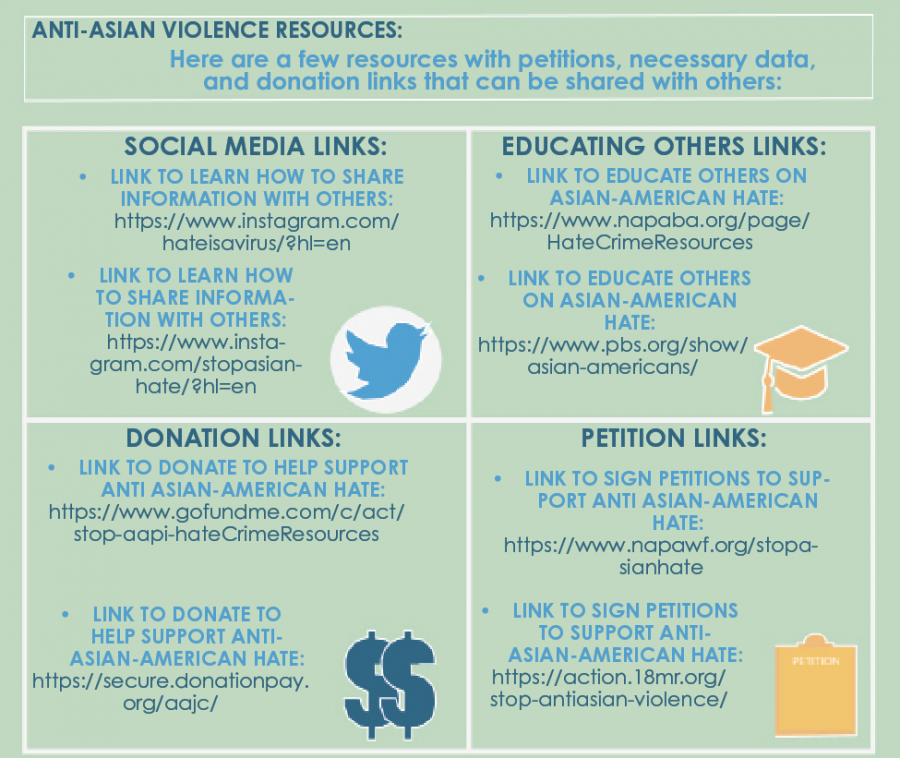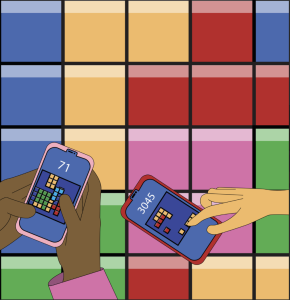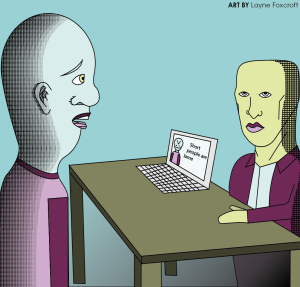Surge in Asian-American hate crimes
May 19, 2021
When COVID-19 first hit the United States, former President Donald Trump began to call the Corona virus the ‘Chinese virus’. Since then, hate crimes around the country against Asian Americans have risen dramatically as many blame Asians for the spread of COVID-19. The US Department of Justice states that a hate crime is defined as a crime motivated by acts of injustice against race, color, religion, national origin, sexual orientation, gender identity, or disability.
Over the past year, there were 122 incidents of anti-Asian American hate crimes in 16 of the country’s most populous cities, showing an increase of almost 150% over the previous year, according to data compiled by California State University’s Center for the Study of Hate and Extremism. Sophomore Ava Wong emphasized her feelings towards the rise of these crimes.
“I don’t feel safe as an Asian American, now more than ever,” Wong said. “Living in a community with a big white population ensures staring and judgment everywhere you go. And you’re always aware of it. Now because of the recent attacks, I’m even more scared. You never know who could attack you or point a gun at you.”
Three weeks ago, in Georgia, three Atlanta area shootings took place in local spas around the city. Out of the eight people killed, seven of the victims were of Asian-American descent. A week later, Keisha Lance Bottoms, the mayor of Atlanta, explained that this shooting was the cause of “built upon hatred for a particular community.”

“The recent attacks on the Asian American women were horrific and unjustified,” Wong said. “The way the white media handled it was almost just as bad. We were told the shooter was having a ‘bad day’. When you have a bad day you take a walk, you don’t go and shoot nine people. These lives were stolen because of harmful stereotypes of Asian women being nothing but sexual objects.”
According to the reporting form by Stop AAPI Hate, almost four thousand hate crimes were reported over the course of the past year in which hateful actions and words were targeted at Asian Americans and Pacific Islanders, most prominently women.
“COVID-19 and the whole agenda against Asian Americans just heightened and intensified the already present xenophobia within certain individuals,” senior Amorah Schultze said. “We have a very tenuous relationship with this country. We’re accepted and celebrated so long as we submit and we’re deferential to the dominant culture and we stay put and we stay silent and we don’t get involved in anyone else’s movement and we don’t fight for awareness for our issues.”
Moreover, with a rise in the number of hate crimes, Asian-Americans like Wong find themselves stuck between their two cultures.
“I don’t think I have one American identity and one Asian identity,” Wong said. “Being Asian-American is a mix of both worlds and it’s hard to be connected and proud of one part when it’s attacking the other. I think that [the increase of these hate crimes] has made me appreciate and love my Asian side in a way that I never have before.”
In contrast, sophomore Donna Kim takes a different approach towards her two cultures, emphasizing her desire towards prioritizing one side over the other.
“As an American, I am honestly so ashamed of this country,” Kim said. “I feel like the authorities have not been doing a lot to lessen the hate crimes against the Asian community in America, and every day more and more Asians die. I am hoping that Biden does something soon for the Asian community in America instead of just releasing a statement about the Asian American attacks.”
Further, Wong introduces the connection between the rise of these hate crimes and the Asian-American discrimination throughout American history, specifically in the education system.
“A lot of people forget about the Chinese Exclusion Act and the Internment of Japanese Americans, which is a big part of not just Asian Americans but also American history,” Wong said. “I think learning about Asian-American history is important to help debunk harmful stereotypes which create these ideas towards crime and expand our education.”
Additionally, Kim shares her experience of growing up with discrimination because of her race in different experiences throughout her life.
“As an Asian American myself, I am so terrified and disgusted at what has been going on,” Kim said. “Growing up in America as an Asian American is already tough enough, and I think a lot of Asian Americans can agree with me on this one. From struggling with identity to people mocking my facial features, to kids making fun of the food I eat and the language I speak, and to wanting to be white and have nothing to do with being Asian, I always struggled with internalized and external issues.”
Kim highlights the ways that Bowie students and non-Asian Americans can help the communities being affected during this surge of hate crimes.
“I think the best way to help right now is to spread the word that Asian hate crimes is a serious things, and many Asians are losing their lives to it everyday,” Kim said. “The best someone can do is to sign petitions, or join in marches and protests.”
Through this experience Wong recognizes the importance of her identity and takes full ownership of who she is, despite this rise of hate against her and her culture.
“I am proud to be an Asian-American and I know I belong here,” Wong said. “We are constantly told to ‘go back to where we came from’ and that ‘we do not belong here’. The constant cruelty and harassment we are handed every day is something we do not deserve and the reason so many hate where they come from. But what they say shouldn’t define who we are. The Asian-American community is beautiful, and I am happy to be a part of it.”









